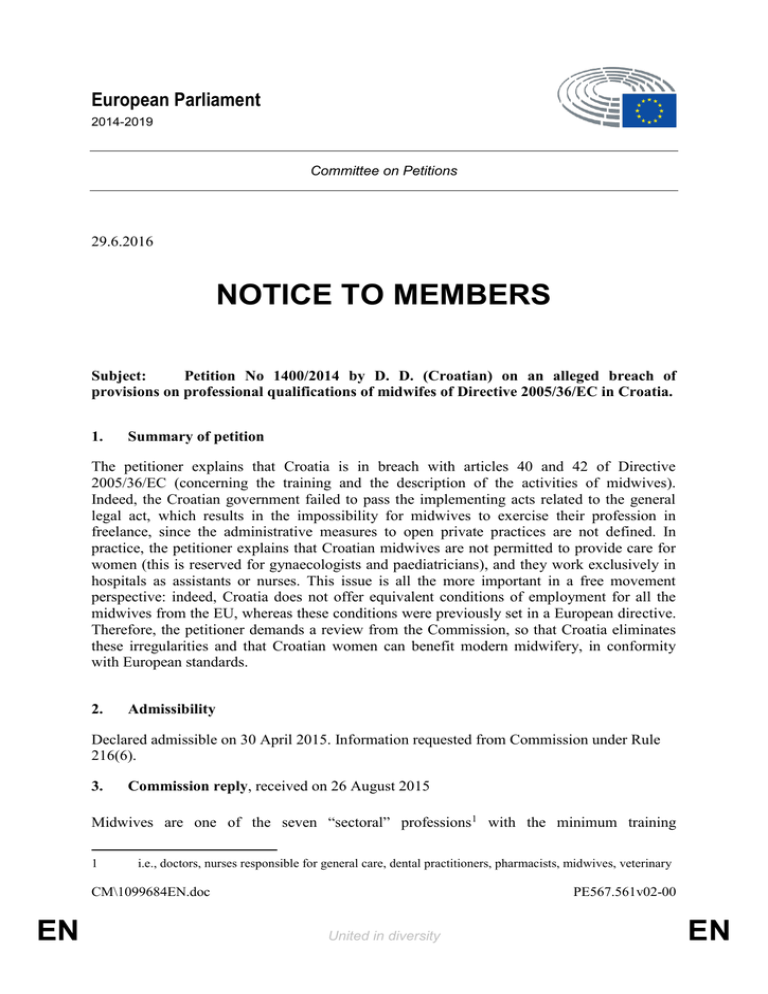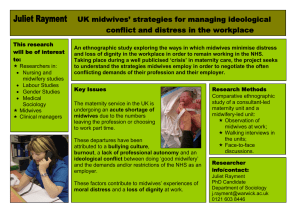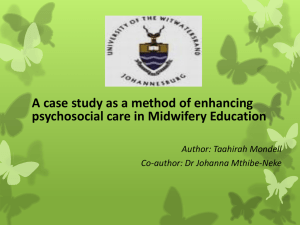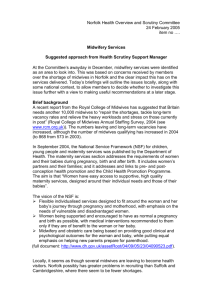en en notice to members
advertisement

European Parliament 2014-2019 Committee on Petitions 29.6.2016 NOTICE TO MEMBERS Subject: Petition No 1400/2014 by D. D. (Croatian) on an alleged breach of provisions on professional qualifications of midwifes of Directive 2005/36/EC in Croatia. 1. Summary of petition The petitioner explains that Croatia is in breach with articles 40 and 42 of Directive 2005/36/EC (concerning the training and the description of the activities of midwives). Indeed, the Croatian government failed to pass the implementing acts related to the general legal act, which results in the impossibility for midwives to exercise their profession in freelance, since the administrative measures to open private practices are not defined. In practice, the petitioner explains that Croatian midwives are not permitted to provide care for women (this is reserved for gynaecologists and paediatricians), and they work exclusively in hospitals as assistants or nurses. This issue is all the more important in a free movement perspective: indeed, Croatia does not offer equivalent conditions of employment for all the midwives from the EU, whereas these conditions were previously set in a European directive. Therefore, the petitioner demands a review from the Commission, so that Croatia eliminates these irregularities and that Croatian women can benefit modern midwifery, in conformity with European standards. 2. Admissibility Declared admissible on 30 April 2015. Information requested from Commission under Rule 216(6). 3. Commission reply, received on 26 August 2015 Midwives are one of the seven “sectoral” professions1 with the minimum training 1 i.e., doctors, nurses responsible for general care, dental practitioners, pharmacists, midwives, veterinary CM\1099684EN.doc EN PE567.561v02-00 United in diversity EN requirements being harmonised at an EU level. The Directive 2005/36/EC on the recognition of professional qualifications contains a number of provisions that touch upon this subject. In particular, the petitioner raises several distinct issues, namely (1) the access of midwives to certain activities guaranteed by the Directive and their level of autonomy from other health care professionals, and (2) the possibilities for Croatian midwifes to carry out their activities in private practices (outside of a hospital setting). Regarding the first issue, Article 42(2) of the Directive indeed requires that the Member States ensure that midwives have access to the minimum scope of activities listed therein. It is on this list that the petitioners have based their allegation claiming, in essence, that certain of these activities are exclusively being carried out by other professionals (such as gynaecologists, general care nurses or paediatricians) to the exclusion of midwifes. In particular, the petitioners claim that midwives in Croatia are not allowed to: provide care services during pregnancy (diagnosis of pregnancies, monitoring normal pregnancies and carrying out examinations required for monitoring normal pregnancies) (see Article 42(2)(b)), which remain exclusive competence of the gynaecologists, and to provide postnatal care of mother and a new born baby (referred to in Article 42(2)(h)-(i)), which is exclusively provided by gynaecologists, general care nurses or paediatricians. If the activities mentioned in Article 42(2) are indeed exclusively reserved to other health professions to the exclusion of midwives in Croatia, this would be in violation of the Directive which obliges the Member States to make sure that midwifes are allowed to access the minimum activities listed therein. However, it is also to be noted that the list of minimum activities set out in Article 42(2) of the Directive does not prevent Member States from deciding that some of these professional activities could be shared with other health care professions. In this context, please note that the concept of independence of midwives has been recently reflected in their minimum training requirements set out in the revised Directive on the recognition of professional qualifications. On 18 January 2014, the revised Directive (as amended by Directive 2013/55/EU) came into force and will have to be implemented in Member States by 18 January 2016. Amongst other things, it has upgraded the minimum list of required knowledge and skills for midwives, which now includes a revised point (d) of Article 40(3) as regards adequate clinical experience allowing midwives to practice independently and under their own responsibility. This new requirement under the revised Directive will oblige Member States to train midwives to be able to act autonomously. However, the new changes will not affect the competence of each Member State to define the attribution of tasks among health care professionals, and in particular to decide whether the midwifery activities listed in Article 42(2) of the Directive can be shared with other medical staff. As regards the issue on the possibility to carry our midwifery activities in private practices, please note that Article 42(2) does not specifically regulate this matter. Article 42(2) does not prescribe whether midwifes should be allowed to carry their activities outside of the hospital surgeons and architects. PE567.561v02-00 EN 2/5 CM\1099684EN.doc setting (i.e. in private practices), nor that Member States should allow for and that they should regulate out-of hospital births (midwifery centres, birth centres, home births). These are the matters belonging solely under the competence of Member States. However, if a Member State chooses to regulate midwifery activities outside of a hospital setting by way of exclusively reserving those activities to medical doctors (to the exclusion of midwives), this should be assessed in the light of provisions of the Treaty on the Functioning of the European Union (TFEU), and in particular in light of those provisions on the freedom of establishment (Article 49 TFEU) and the freedom to provide services (Article 57 TFEU) and based on well-established case law of the European Court of Justice. According to the European Court of Justice, Member States must comply with provisions on Internal Market freedoms, since those provisions prohibit Member States from introducing or maintaining unjustified restrictions on the exercise of those freedoms.1 With regard to the freedom of establishment and the freedom to provide services in the healthcare sector in particular, the Court of Justice of the European Union indicated that Member States have a wide measure of discretion in the level of protection they wish to give to public health and the way in which that level is to be achieved. Conclusion In view of the above and based on the limited information available to the Commission, the Commission is not in a position to establish whether the relevant Croatian regulatory provisions (the Midwifery Act and the alleged lack of implementing regulations) as well as the practice are in violation of Directive 2005/36/EC and/or the fundamental freedoms of establishment (Article 49 TFEU) and provision of services (Article 57 TFEU). The Commission services are in the process of enquiring with the Croatian authorities by way of opening an EU Pilot case. As regards other issues raised by the petitioner (such as the alleged breach of the European Convention on Human Rights), it shall be noted that these matters fall outside the scope of the Directive on the mutual recognition of professional qualifications. 4. Commission reply, received on 29 June 2016 On the basis of the assessment of information provided by the Croatian authorities through the EU Pilot case, the Commission would like to complement the answer to this petition. The petitioner alleged that Croatian legislation as well as practise was in violation of Directive 2005/36/EC with regard to (1) the access of Croatian midwives to certain activities listed in Article 42(2) of the Directive, in particular care services during pregnancy and in the post natal period, as well as to (2) the level of autonomy from other health care professionals, and (3) the lack of possibilities for Croatian midwifes to carry out their activities in private practices (outside of a hospital setting). Regarding the first issue, it appears that Article 42(2) of Directive 2005/36/EC has been fully transposed into Croatian law by means of Article 39(2) of the Croatian Act on regulated 1 See e.g., case C-108/96, Mac Quen, paras.24, and C-294/00 Grabner, para.39. CM\1099684EN.doc 3/5 PE567.561v02-00 EN professions and recognition of foreign professional qualifications (NN No 82/15). In particular, Article 39(2) (b) provides that midwives are entitled to pursue the following activities during pregnancy: diagnose pregnancies, monitor normal pregnancies and carry out examinations required for the monitoring of normal pregnancies. Article 39(2) (h) and (i) provide that midwives are entitled to care for the new-born and the mother in the post-natal period. Accordingly, the allegation of the petitioners that under current Croatian legislation midwives cannot provide care services during pregnancy and in the post natal period does not seem to be justified. However, access to these activities depends on compliance with training requirements under Article 40 of Directive 2005/36/EC. According to information provided by the Croatian authorities, the first generation of pre-accession trained midwives that fulfil the abovementioned training requirement graduated in 2011. Until 2011, the activities referred to in Article 42(2) of Directive 2005/36/EC could only be performed by specialist gynaecologists and obstetricians. Finally, regarding the midwifery profession in Croatia, a distinction should also be made between the profession of a midwife and of a midwife assistant. The Croatian Midwifery Act (NN Nos 120/08 and 145/10) regulates inter alia the activities and qualification requirements for both professions. Article 7 of the Midwifery Act provides that midwives are required to hold a bachelor's degree. In order to work independently, they have to be authorised by the Croatian Board of Midwives. Article 14(1) lays down the conditions for obtaining such authorisation. The so-called midwife assistant holding secondary school qualifications is not an independent profession and can only work as a part of a team led by a midwife. Regarding the second issue, namely the possibility of midwives to act autonomously from other health professionals and the relevant rights that they can derive in this respect from Directive 2005/36/EC, a distinction has to be made between training for and exercising the profession. Directive 2005/36/EC sets out in its Article 40(3) minimum training requirements for midwives and obliges Member States to train them to be able to act autonomously. This provision is transposed into Croatian law by means of Article 39(1)(d) of the Croatian Act on regulated professions and recognition of foreign professional qualifications (NN No 82/15). Furthermore, the Directive lists in its Article 42(2) a minimum scope of activities to which midwives should have access. However, it rests within the competence of the Member State to decide whether all or some of these activities can be exercised by midwives under supervision and/or whether they can also be exercised by other medical staff. The reason for this is that in the area of healthcare, Article 168 (7) of the Treaty on the Functioning of the European Union acknowledges Member States' responsibilities for the definition of their health policy and for the organisation and delivery of health services and medical care. In other words, while midwives should be trained to act autonomously under the Directive, it is left to each Member State to decide, in the context of any given health system, the exact way such services are to be delivered and under who's ultimate responsibility. Finally, the last issue raised by the petitioner is the possibility for midwives to carry out their activities in private practices. Article 42(2) of Directive 2005/36/EC does not prescribe whether midwifes should be allowed to carry their activities outside of the hospital setting PE567.561v02-00 EN 4/5 CM\1099684EN.doc (i.e. in private practices), nor that Member States should allow for and/or regulate out-of hospital births (midwifery centres, birth centres, home births). These are the matters under the competence of Member States. However, if a Member State chooses to regulate midwifery activities outside of a hospital setting by way of reserving those activities to medical doctors (to the exclusion of midwives), this should be assessed in the light of provisions of the Treaty on the Functioning of the European Union (TFEU), and in particular in light of those provisions on the freedom of establishment (Article 49 TFEU) and the freedom to provide services (Article 57 TFEU) and based on well-established case law of the European Court of Justice. According to information provided by Croatia, home birth is not regulated by law in this country and under the current legislation childbirths in Croatia must be performed in health institutes only, except for so called accidental and emergency child births. Thus, home births may not be performed by any health worker, such as a doctor of gynaecology and obstetrics or a midwife. In view of the above, there seems to be no violation of Directive 2005/36 /EC or of the Treaty provisions on the freedom of establishment and the freedom to provide services. Conclusion Based on the information available to the Commission, the relevant Croatian regulatory provisions do not seem to be in violation of Directive 2005/36/EC and the fundamental freedoms of establishment (Article 49 TFEU) and provision of services (Article 57 TFEU). CM\1099684EN.doc 5/5 PE567.561v02-00 EN



![Letter to MPs re: maternal mental health report Dear [Name of MP] I](http://s3.studylib.net/store/data/006839335_1-7d7b3127aade7ad6d126565942ce75c1-300x300.png)
